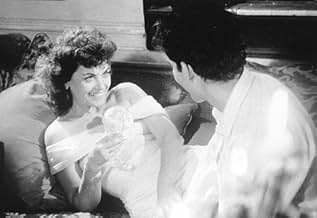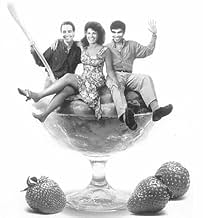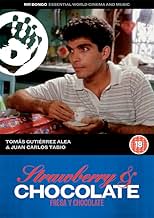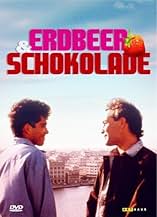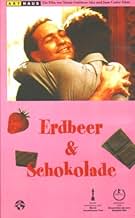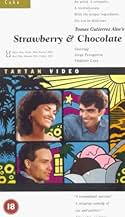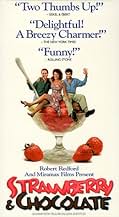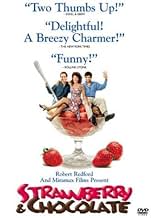CALIFICACIÓN DE IMDb
7.4/10
6.2 k
TU CALIFICACIÓN
La historia de dos hombres que son completos opuestos: uno gay, el otro hetero; uno comunista, el otro individualista; uno desconfiado, el otro confiado; y de como llegan a quererse.La historia de dos hombres que son completos opuestos: uno gay, el otro hetero; uno comunista, el otro individualista; uno desconfiado, el otro confiado; y de como llegan a quererse.La historia de dos hombres que son completos opuestos: uno gay, el otro hetero; uno comunista, el otro individualista; uno desconfiado, el otro confiado; y de como llegan a quererse.
- Dirección
- Guionistas
- Elenco
- Nominado a 1 premio Óscar
- 25 premios ganados y 2 nominaciones en total
Opiniones destacadas
This film isn't just an "odd couple" story, as it can appear at a first glance. This is a landmark Cuban film about the plight of homosexual artists in Communist Cuba. Being homosexual in Cuba in the 60's and 70's, maybe even the 80's, could mean incarceration or being sent to "colonies", often hard labour camps. What makes this film extraordinary is that it was made by a Cuban director who had been himself part of the Communist intelligenzia at the beginning, but could still be objective and therefore critical of the intolerance of real socialism. What also makes the film extraordinary is that the film itself was a box office success in Cuba and helped change attitudes towards homosexuality. Tomás Gutiérrez Alea, or Titón, as he was known in Cuba, is the greatest and best loved Cuban filmmaker, with a trademark black humour, best exemplified in his outstanding films Memorias del subdesarrollo (Memories of Underdevelopment) (1968) and La Muerte de un burócrata (Death of a Bureaucrat) (1966). His last film, Guantanamera (1994), which he made when ill with cancer, is a black comedy of "funeral" errors and criticism of Cuban bureaucracy. This is his legacy, the way he wanted his public to remember him, laughing at death.
9B24
Any perceptive viewer of this film will recognize quickly what it does and does not represent. We can be easily misled by previews or trailers promising stereotypical characters or cheap thrills, designed only to attract attention. They can be a turn-off as well. In this case I was fortunate enough to get past the marketing and into what turned out to be a truly well-made and fascinating film of extraordinary literary dimensions.
First, it is a profoundly anti-fascist and anti-totalitarian tale. Internal references to famous Cuban writers and musicians frame every scene, while the players entertain us with character sketches involving such mundane things as romantic urges, kitsch as art, and ice cream. The action is fast-paced. One bit resolves itself into another with ease. Musical scoring and editing are appropriate in every way -- always a hallmark of any good film.
But it is great acting and great directing that put this one over the top into Oscar league contention. A true "must-see."
First, it is a profoundly anti-fascist and anti-totalitarian tale. Internal references to famous Cuban writers and musicians frame every scene, while the players entertain us with character sketches involving such mundane things as romantic urges, kitsch as art, and ice cream. The action is fast-paced. One bit resolves itself into another with ease. Musical scoring and editing are appropriate in every way -- always a hallmark of any good film.
But it is great acting and great directing that put this one over the top into Oscar league contention. A true "must-see."
`Strawberry and Chocolate' (1993)is set in contemporary Havana. The luster of that city has dimmed after nearly four decades of Castro's rule. David (Vladimir Cruz), a student and avid Castro supporter, is on the rebound after losing his girlfriend. He had taken her to a cheap hotel to make love, but the place is so shabby it puts her off. Instead, he promises never to touch her until they marry. In the next scene, she marries someone else while David stands sullenly among the well wishers at the registry office. Then he meets Diego (Jorge Perugorría).
Diego, who is flamboyantly gay, parks himself at David's table in an outdoor café to eat a dish of strawberry ice cream. For David, this is suspicious because chocolate is also available. Diego says some people like chocolate, some like strawberry, an innocuous line that gives the movie its title and also hints at the odd couple relationship to follow.
Diego does not disguise his sexual interest in David, but is also interested in giving David an education the regime denies him. The older man is far more cultured than his new friend. Offers of books banned in Castro's Cuba, such as a novel by Mario Vargas Llosa or the poems of John Donne, lure David to his apartment for tea and talk. When David reports that Diego is involved with a forbidden art exhibit, he is directed to befriend Diego to find out more information. `Strawberry and Chocolate' thus sets their emerging friendship against the backdrop of two bleak themes: anti-gay prejudice in the Castro regime, and the betray-thy-neighbor expectation of a police state.
But almost nobody conforms to type. A woman in Diego's building who is part of the neighborhood Vigilance Committee, on the watch for counter-revolutionary activities, turns out to be a good friend to Diego and then to David. Everyone plays one game with the government, but a different one in their private lives. This is a lesson David has to learn. Encounters with women along the way provide a few subplots, but the heart of the story lies in the hearts of the two men.
`Strawberry and Chocolate' is credited to directors Tomás Gutiérrez Alea and Juan Carlos Tabío. The former was, until his death shortly after completing this film, the best known filmmaker in Cuba, winning an international reputation in the 1960's for titles such as `Memoirs of Underdevelopment,' a look at life in Cuba in the early Castro years that tempers criticism with prudence. `Strawberry' is smaller in scale and less overtly political.
The film was nominated for an Oscar in 1995 and won awards at film festivals around the world (including the Sundance Festival). American viewers may instantly slot it with Hollywood features that show how straight characters learn life lessons from a wiser gay companion (`Boys on the Side,' `As Good As It Gets'). And at times Diego's excesses recall the worst performances of Harvey Fierstein. Yet superb performances by the two male leads eventually move beyond stereotypes they and the audience initially share about each other, transforming their unexpected friendship into a statement that puts the lie to official groupthink in a repressive regime.
Diego, who is flamboyantly gay, parks himself at David's table in an outdoor café to eat a dish of strawberry ice cream. For David, this is suspicious because chocolate is also available. Diego says some people like chocolate, some like strawberry, an innocuous line that gives the movie its title and also hints at the odd couple relationship to follow.
Diego does not disguise his sexual interest in David, but is also interested in giving David an education the regime denies him. The older man is far more cultured than his new friend. Offers of books banned in Castro's Cuba, such as a novel by Mario Vargas Llosa or the poems of John Donne, lure David to his apartment for tea and talk. When David reports that Diego is involved with a forbidden art exhibit, he is directed to befriend Diego to find out more information. `Strawberry and Chocolate' thus sets their emerging friendship against the backdrop of two bleak themes: anti-gay prejudice in the Castro regime, and the betray-thy-neighbor expectation of a police state.
But almost nobody conforms to type. A woman in Diego's building who is part of the neighborhood Vigilance Committee, on the watch for counter-revolutionary activities, turns out to be a good friend to Diego and then to David. Everyone plays one game with the government, but a different one in their private lives. This is a lesson David has to learn. Encounters with women along the way provide a few subplots, but the heart of the story lies in the hearts of the two men.
`Strawberry and Chocolate' is credited to directors Tomás Gutiérrez Alea and Juan Carlos Tabío. The former was, until his death shortly after completing this film, the best known filmmaker in Cuba, winning an international reputation in the 1960's for titles such as `Memoirs of Underdevelopment,' a look at life in Cuba in the early Castro years that tempers criticism with prudence. `Strawberry' is smaller in scale and less overtly political.
The film was nominated for an Oscar in 1995 and won awards at film festivals around the world (including the Sundance Festival). American viewers may instantly slot it with Hollywood features that show how straight characters learn life lessons from a wiser gay companion (`Boys on the Side,' `As Good As It Gets'). And at times Diego's excesses recall the worst performances of Harvey Fierstein. Yet superb performances by the two male leads eventually move beyond stereotypes they and the audience initially share about each other, transforming their unexpected friendship into a statement that puts the lie to official groupthink in a repressive regime.
10esh04676
I agree with all the positive things already so well put forth by other reviewers and say that I liked this film a lot. Jorge Perugorria is incredible as the slightly "queenie" gay man. I have seen him in other films where is so different, as a very macho truck driver, for instance. Here he is the art and book lover and appreciator of good food and drink, as well as attractive young men. His "education" of the stern young Cuban Communist (an excellent Vladimir Cruz), a very straight man with intense emotional animosity toward gays, becomes a study in the resolution of human relationships triumphing over social and political obstacles.The comradely embrace of the two men , symbolizing their understanding and acceptance of each other despite superficial differences, was a masterstroke at the end of this fine film.
This movie is about accepting difference and learning to appreciate other points of view and other ways of life. It's not really a movie about gay men - get over that! It's about friendship, and about the love Cubans feel for their country. Jorge Perugorría is absolutely great in this role, as are all of the other characters. The scenes of Havana are beautiful and heartbreaking. This film conveys what it must feel like for Cubans to leave their country, and how difficult that is. It's also about learning to think for yourself and to have opinions and do things that others might not find "politically correct." There's nothing subversive about this movie, and nothing that you need to hide from the kids. In fact, I recommend that people show the film to their teenagers and talk about it, because it sends such a great message about accepting people as they are. It's also tender and funny, and has just the right balance of humor and drama. Nancy (Mirta Ibarra) is wonderful.
¿Sabías que…?
- TriviaCuba's official submission to the Best Foreign Language Film category for the 67th Academy Awards. As of 2020, it remains the only Cuban film to be nominated for an Oscar.
- ErroresThe blue Cadillac seen at the end of the film was not made until the 1987 model year.
Selecciones populares
Inicia sesión para calificar y agrega a la lista de videos para obtener recomendaciones personalizadas
- How long is Strawberry & Chocolate?Con tecnología de Alexa
Detalles
Taquilla
- Total en EE. UU. y Canadá
- USD 2,080,805
- Total a nivel mundial
- USD 2,087,569
- Tiempo de ejecución
- 1h 48min(108 min)
- Color
- Mezcla de sonido
- Relación de aspecto
- 1.85 : 1
Contribuir a esta página
Sugiere una edición o agrega el contenido que falta

